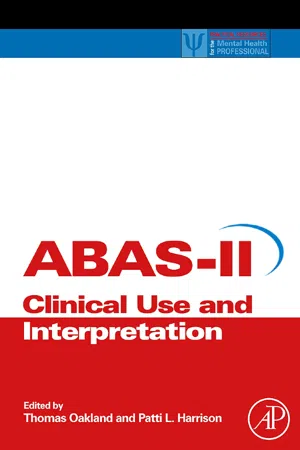
Adaptive Behavior Assessment System-II
Clinical Use and Interpretation
- 432 pages
- English
- PDF
- Available on iOS & Android
Adaptive Behavior Assessment System-II
Clinical Use and Interpretation
About this book
Adaptive Behavior Assessment System-II summarizes information on adaptive behavior and skills as well as general issues in adaptive behavior assessment with the goal of promoting sound assessment practice during uses, interpretations, and applications of the Adaptive Behavior Assessment System-II.Adaptive behavior and skills refer to personal qualities associated with the ability to meet one's personal needs such as communication, self-care, socialization, etc. and those of others. Data from measures of adaptive behavior have been used most commonly in assessment and intervention services for persons with mental retardation. However, the display of adaptive behaviors and skills is relevant to all persons. The Adaptive Behavior Assessment System-II (ABAS-II) provides a comprehensive, norm-referenced assessment of the adaptive behavior and skills of individuals from birth through age 89. The comprehensive natures of the ABAS-II, ease in administration and scoring, and wide age range have resulted in its widespread use for a large number of assessment purposes. The book provides practical information and thus serves as a valuable resource for those who use the ABAS-II.- Assists in the functional use of the ABAS-II- Provides case studies illustrating use of the ABAS-II in comprehensive assessment and intervention planning- Reviews scholarship on adaptive behaviors and skills- Describes legal, ethical, and other professional standards and guidelines that apply to the use of the ABAS-II and other measures of adaptive behavior- Discusses the use of the ABAS-II with autism, mental retardation; young children and those in elementary and secondary school; as well as incarcerated persons being evaluated for possible mental retardation
Trusted by 375,005 students
Access to over 1 million titles for a fair monthly price.
Study more efficiently using our study tools.
Information

Table of contents
- FRONT COVER
- ADAPTIVE BEHAVIOR ASSESSMENT SYSTEM-II: CLINICAL USE AND INTERPRETATION
- COPYRIGHT PAGE
- CONTENTS
- PREFACE
- LIST OF CONTRIBUTORS
- SECTION I: INTRODUCTION
- SECTION II: ABAS-II AND ADAPTIVE SKILL AREAS
- SECTION III: ABAS-II AND ASSESSMENT ACROSS AGE RANGES
- SECTION IV: ABAS-II AND ASSESSMENT FOR SPECIAL POPULATIONS
- INDEX
Frequently asked questions
- Essential is ideal for learners and professionals who enjoy exploring a wide range of subjects. Access the Essential Library with 800,000+ trusted titles and best-sellers across business, personal growth, and the humanities. Includes unlimited reading time and Standard Read Aloud voice.
- Complete: Perfect for advanced learners and researchers needing full, unrestricted access. Unlock 1.4M+ books across hundreds of subjects, including academic and specialized titles. The Complete Plan also includes advanced features like Premium Read Aloud and Research Assistant.
Please note we cannot support devices running on iOS 13 and Android 7 or earlier. Learn more about using the app